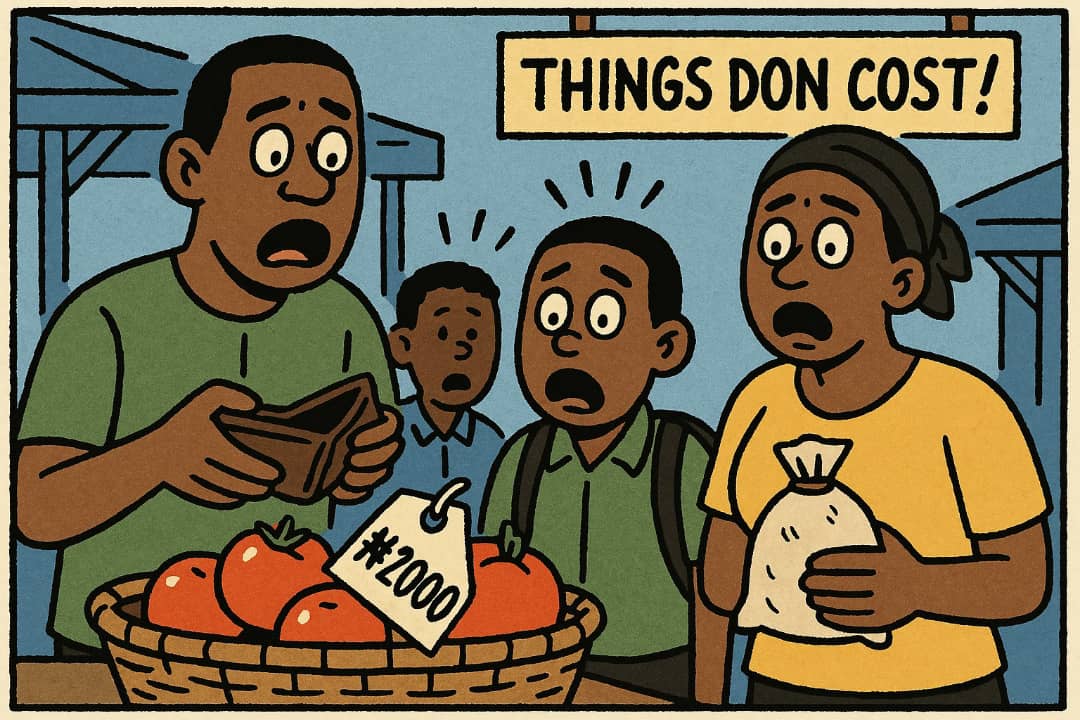Economy
How Rising Inflation May Affect Life in Nigeria

The International Monetary Fund (IMF) has projected that Nigeria’s inflation rate will rise to 37% in 2026. This prediction suggests that the cost of living may continue to increase, posing challenges for Nigerians in the coming years.
Inflation means that the prices of goods and services will go up. When prices rise, the value of money drops. That means ₦1,000 may not buy as much as it used to. In 2026, if the inflation rate reaches 37%, things like food, transportation, housing, and school fees may become more expensive for most families.
When inflation is high, salaries and wages do not increase at the same speed as prices. For example, a civil servant who earns ₦70,000 monthly may find it harder to cover basic needs like feeding and transport if food and fuel prices double or triple. This may force people to reduce what they buy or look for additional sources of income.
Some people try to protect themselves by saving in foreign currency, like US dollars, instead of naira. Others buy things that can keep value over time, like land, gold, or shares. But not everyone can afford these options. Many Nigerians rely only on naira for their daily lives. When the currency loses value quickly, it affects people in rural areas more, especially those who do not have access to financial services or support.
One cause of rising inflation in Nigeria is the high cost of importing goods. Nigeria depends on foreign countries for many things, including food, fuel, medicine, and machines. When the exchange rate of the naira to the dollar becomes weaker, the prices of these imported goods increase. For example, if the dollar goes from ₦800 to ₦1,500, it means a bag of rice or carton of milk that was ₦30,000 may go up to ₦60,000 or more.
Another factor is removal of subsidies. When the government removes fuel subsidies, it leads to higher transport costs. Transport affects all parts of the economy, from farming to trading. A farmer in Benue or Kaduna may spend more to move tomatoes to Lagos. Traders will pass that cost to consumers. So, even local products become more expensive when fuel prices rise.
The Central Bank of Nigeria (CBN) uses monetary policy to try and control inflation. One method is increasing interest rates so that people and businesses borrow less money. When there is less money moving around, demand goes down, and this can slow down price increases. However, high interest rates can also affect small businesses, especially those that need loans to grow. So, while it may reduce inflation a little, it may also slow down economic activities for regular people.
Many Nigerians are now focusing more on budgeting. Budgeting helps people plan how to spend their money based on what they earn. A basic household budget should include food, housing, school fees, electricity, and transport. It is also important to track spending and cut down on non-essential items, like eating out or buying luxury items. Using local alternatives instead of imported products is another way to save money.
In some places, people are forming savings groups. These are small cooperative groups where members contribute money monthly and take turns collecting the total amount. This helps them to handle bigger expenses like rent or school fees. It also gives members a way to save without going through banks, which may charge fees or offer low interest.
Agriculture may help some people cope with inflation. Planting small farms around the home can reduce food bills. Items like tomatoes, okra, maize, and pepper can be grown in bags or containers. This will not solve all problems, but it can help reduce the amount of money spent on food.
Some Nigerians are also learning digital skills to earn money online. Skills like graphic design, writing, video editing, and online teaching can help people get jobs that pay in foreign currency. This means they can earn money that is not affected by naira inflation. These jobs may be hard to find at first, but many free courses and training are available online or through community tech hubs.
For those with physical businesses, adjusting prices gradually and offering smaller packages can help maintain customers. For example, instead of selling a full loaf of bread, some bakers now sell half-loaves or smaller slices. This way, customers can still afford the product, and the business does not lose them completely.
People should also be careful about fraud during inflation. When prices are high, scammers take advantage of people looking for cheaper deals. Some sell fake products or promise returns on investment that are not real. Before joining any money scheme or buying expensive goods online, it is important to check reviews, ask trusted people, and use secure payment methods.
Schools may also feel the impact. Some private schools may increase fees to cope with the rising cost of textbooks, fuel for generators, and salaries for staff. Parents may need to talk to schools about payment plans or consider alternative education options if fees become too high.
Health care costs may rise too. Medicines and hospital equipment are mostly imported. Clinics may start charging more for treatment. People are advised to join community health insurance where available. This can reduce the cost of visiting hospitals, especially for children and pregnant women.
Landlords may increase rent, especially in urban areas like Abuja and Lagos. Tenants can try negotiating longer-term agreements to lock in lower rent. In some cases, people may move to smaller houses or share rent with friends or family to reduce cost.
The IMF prediction is not a guarantee, but it is based on current trends. If the government makes strong policies to increase local production, stabilize the currency, and improve infrastructure, inflation may not rise as high as 37%. But if problems like insecurity, oil theft, and corruption continue, then things may get worse before they get better.
Young people who are still in school should also start learning how money works. Understanding how to save, avoid debt, and look for opportunities can help prepare them for the future. Parents can teach children small money habits like keeping track of what they spend or helping with home gardens.
Local businesses and communities can also work together. Buying from local traders instead of imported brands helps keep money in the area. Supporting made-in-Nigeria goods also reduces pressure on foreign exchange.
People with steady jobs can try setting aside some money monthly, even if small. Saving during hard times is difficult, but it helps prepare for emergencies. It also reduces stress if inflation becomes worse than expected.
Nigerians who have family members abroad sometimes receive money through remittances. This can provide support during inflation. It is important to use trusted money transfer services and avoid sending or receiving money through unknown contacts.
Inflation also affects government projects. When prices go up, it becomes more expensive to build roads, schools, and hospitals. This can slow down development in rural and urban areas. Citizens can demand transparency and ask leaders to explain how public funds are spent.
Electricity bills may also rise as power providers adjust prices based on inflation. Some households are turning to solar energy or prepaid meters to manage usage better. Using energy-saving bulbs and turning off appliances when not in use can help reduce bills.
Transportation services like buses, okadas, and ride-hailing apps may increase fares. Passengers can try to group transport with friends, walk short distances, or use public buses instead of private taxis when possible.
People planning events like weddings or funerals should also review their budgets. Using local halls, home cooking, and reducing guest lists can help cut down expenses without removing the meaning of the event.
Although 2026 is still some months away, many people are already seeing signs of high inflation. Understanding what is happening and making small adjustments early can help families survive. Everyone may not be able to stop inflation, but they can prepare for it.
If the IMF prediction comes true, Nigerians may need to depend more on their communities, skills, and creativity to survive. Governments, companies, and individuals all have a role to play in reducing the damage caused by inflation. Working together and sharing information can help reduce the pain that inflation brings.


 Digital Hustle5 months ago
Digital Hustle5 months agoHow to Make Real Money Online Using Simple Ways

 Money Moves5 months ago
Money Moves5 months agoHow to Avoid Bank Account Problems

 Stay Human5 months ago
Stay Human5 months agoHow to Know If You Are Losing Your Human Side

 Money Moves5 months ago
Money Moves5 months agoSimple Ways to Make Money the Honest Way

 Local Genius Spotlight5 months ago
Local Genius Spotlight5 months agoSimple Steps That Made Ian Williams a Leader

 Money Moves5 months ago
Money Moves5 months agoHow to Make Money Without Stress

 Local Genius Spotlight5 months ago
Local Genius Spotlight5 months agoWays Small Entrepreneurs Grow from Nothing

 Money Moves5 months ago
Money Moves5 months agoHow to Build Wealth and Keep Your Time

































